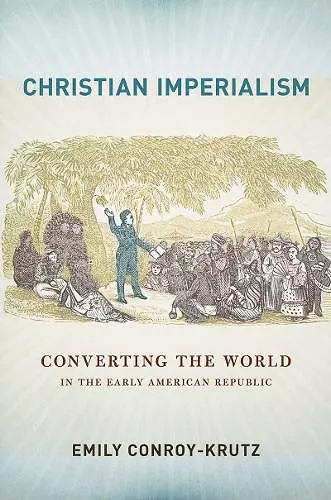Christian Imperialism
Converting the World in the Early American Republic
Format:Hardback
Publisher:Cornell University Press
Published:18th Nov '15
Currently unavailable, and unfortunately no date known when it will be back
This hardback is available in another edition too:
- Paperback£26.99(9781501725098)

In 1812, eight American missionaries, under the direction of the recently formed American Board of Commissioners for Foreign Missions, sailed from the United States to South Asia. The plans that motivated their voyage were ano less grand than taking part in the Protestant conversion of the entire world. Over the next several decades, these men and women were joined by hundreds more American missionaries at stations all over the globe. Emily Conroy-Krutz shows the surprising extent of the early missionary impulse and demonstrates that American evangelical Protestants of the early nineteenth century were motivated by Christian imperialism—an understanding of international relations that asserted the duty of supposedly Christian nations, such as the United States and Britain, to use their colonial and commercial power to spread Christianity.
In describing how American missionaries interacted with a range of foreign locations (including India, Liberia, the Middle East, the Pacific Islands, North America, and Singapore) and imperial contexts, Christian Imperialism provides a new perspective on how Americans thought of their country’s role in the world. While in the early republican period many were engaged in territorial expansion in the west, missionary supporters looked east and across the seas toward Africa, Asia, and the Pacific. Conroy-Krutz’s history of the mission movement reveals that strong Anglo-American and global connections persisted through the early republic. Considering Britain and its empire to be models for their work, the missionaries of the American Board attempted to convert the globe into the image of Anglo-American civilization.
In 1810 four young evangelical Christian men at Andover Theological Seminary made the decision to dedicate their lives to missionary work and petitioned the Commonwealth of Massachusetts to form a missionary society, the lofty American Board of Commissioners for Foreign Missions (ABCFM). In 1812, the first group of young men and their wives set out to convert the world to Christianity, launching what would become the largest missionary organization in the UnitedStates. This story has been well told within the burgeoning subspecialty of American missionary history.... Conroy-Krutz's contribution to this history is an innovative approach to understanding the first thirty years (1812–1846). Rather than focusingon the institution’s internal history or missionary theology, she relocates it as a study in imperialisms: the Christian imperialism to convert the world in tandem with the British and American political imperialisms to which missionaries attached themselves in choosing.... Christian Imperialism adds a new perspective to the history of the American Board.
-- Roberta Wollons * New England Quarterly *Conroy-Krutz has several objectives, all of which interweave to produce a compelling overall analysis about America's place in the world and how religion helped to shape it.... Conroy-Krutz's most important scholarly intervention is her typology of imperialism and her deft discussion of the ways in which different types of empire, not just American, intersected but also competed with one another.... Christian Imperialism is a superb addition to the burgeoning subfield of work that uncovers the religious aspects of America's engagement with the wider world.
* Church History *By focusing on the efforts of the American Board of Commissioners for Foreign Missions (ABCFM), the largest missionary organization of the antebellum era, Conroy-Krutz shows how debates about religion and race in the United States were thoroughly shaped by conceptions of "heathens" abroad. Christian Imperialism's extensive use of ABCFM internal sources allows the missionaries to emerge as three-dimensional, complicated people. Taking the mutually constitutive natures of religion and race for granted, [Conroy-Krutz reframes] the parameters of "American religious history." [This book makes] a convincing case that American studies scholars must take religion seriously as an integral part of racial formation and an engine of historical change."
* American Quarterly *Emily Conroy-Krutz offers a transnational and implicitly comparative discussion of an aspect of Protestant triumphalism in nineteenth-century America.... Christian imperialism offers a fresh and compelling slant on the politics of missionary activity. Joel Barlow was wrong: the early American republic did have the character of a Christian nation.
* Journal of Ecclesiastical History *Wisely, the author of this book follows the suggestion of Paul Kramer ‘to use imperialism as a tool of analysis... something to think with more than think about.’ She sees Christian imperialism ‘as a vision and not a reality’ (10).
-- Martin E. Marty, University of Chicago * The Historian *Conroy-Krutz is at her best when describing political complexities, ambiguities, and perplexities that arose as the Board attempted to carry out its vision in a world dominated by Western imperialism.
-- Jay R. Case * The Journal of Religion *[A] welcome contribution to the intersection of Vast Early America, American Religious History, Missions History, and American Foreign Relations History.
* Religious Studies ReviISBN: 9780801453533
Dimensions: unknown
Weight: 454g
264 pages